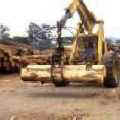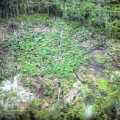| 羅馬,義大利,2001-03-13 (ENS)
對於一份顯示全球林地消失速率減緩的聯合國分析報告,今天兩個具影響力的環保團體提出質疑。二個團體都認為林地消失的速率不但沒有減緩,在熱帶地區甚而是增加的。
這些數據相當重要,因為地球上各地所有類型的森林合法管理架構,可能會以它們作為基礎來發展。

在辛巴威,原木由林場被運送到鋸木場。(P. Jenkin 攝 糧農組織 提供)
聯合國糧農組織(FAO)的森林委員會這一整個禮拜都在羅馬總部開會,它將面對世界資源協會(WRI)與世界自然基金會(WWF)針對該分析結果的異議。
森林委員會是糧農組織在國際間,有關森林政策與技術議題討論上最主要的討論會。這個禮拜的會議有100個以上的糧農組織會員國參加,他們將會聽證委員會對2001年全球森林現況的報告。
根據糧農組織在1月下旬提前公佈的報告指出,全球林地減少的速率已減緩至年約9百公頃,這比上次1995年報告的數據減少了20%。糧農組織從事全球林地評估已有50年了。
但是,總部設於華盛頓特區的世界資源協會,它所製作的調查報告則發現了糧農組織報告的漏洞。這份新調查報告「解析2000年森林資源分析」的作者艾密莉•馬修斯表示:熱帶國家自然森林的急遽減少情形依然持續。
她說,「如果將全球森林區域整體及區域內的狀況差異列入考慮,則糧農組織所指林地減少的速度減緩,其實是誤導的說法。」

伐木在亞馬遜的雨林留下了一個洞。(雨林藥用植物學 提供)
世界資源協會的報告發現:在熱帶非洲地區,林地減少的速率提昇,在中美洲維持不變,只有在熱帶亞洲及南美洲有些微的減緩。
該協會的研究指出,因為糧農組織發表的「速率變化淨值」結合了天然林跟開墾區面積的改變速率,這使得林地實際減少的速率,更難被了解。
在1990年代,平均一年全球種植面積三百萬公頃的新墾殖區,糧農組織將它視為足以彌補天然林地的減少。
如果新墾殖區不列入考量,熱帶天然林每年大約減少1千6百萬公頃。
馬修斯說:「除了拉丁美洲,所有熱帶地區林地的濫伐狀況更為嚴重。1990年代中被破壞的熱帶林地比1980年代還多。」
世界自然基金會美國分會的全球森林計劃主持人布魯斯•卡巴立,認同這項說法:「基於全球50多個國家、300多個進行中的森林計劃,其中所累積的經驗,世界自然基金會不相信林地減少的速率正在減緩,反而,以相當於或更甚於1980年代的速度持續發生,我們必須警覺而不能自滿。」
進行這些分析的糧農組織官員們也對可能的自滿提出警告。糧農組織森林部門的常事副主委Hosny El-Lakany曾在準備這些報告時表示:「這些初步的研究結果,並不代表對抗林地減少的戰役已經結束,林地減少的速率下降也不能用來當作非可持續性地利用森林的藉口。

澳洲維多利亞澳大維森林裡,濁水脊的濫伐林場。(Paul McMahon 提供)
這個星期內,糧農組織森林委員會也在考慮著各類森林永續管理的規範與觀察指標,及衍生的認證及交易問題。
委員們將會檢視森林管理問題與氣候變遷及京都議定書的關係。對於京都協議作為限制39個工業化國家的溫室效應氣體排放的國際協議,各國將於今夏再度協商。
該委員會的討論將促成設立一個新的政府間國際組織,名為聯合國森林會議(UNFF)。
聯合國經濟與社會理事會在2000年10月18日的會期中,決定聯合國森林會議以附屬機構的方式成立,將會開放給所有的聯合國會員國參與。
這新機構將會由聯合國系統底下有關森林組織的執行長們,與提供非正式會議與諮詢的地方機構,一起組成的合作性森林團體來維持。
這會議將每年進行兩週會議,且召集專家提供科學及技術上的建議,同時也考量有利於環境技術的資金及技術轉移策略。
聯合國森林會議這個新機構,預計將採用這份目前受到質疑的糧農組織林地減少評估數據作為基礎,用以發展足以涵蓋各類林地的合法管理架構。
有關糧農組織全球森林分析的更多資料,請參考http://www.fao.org/forestry/
想要看世界資源協會的報告,請參考:http://www.wri.org
全文與圖片詳見: http://ens-news.com/ens/mar2001/
2001L-03-12-01.html
版權歸屬Environment News Service(ENS),環境信託基金會(徐怡德 譯,林以楠、蔡麗伶 審校)
中英對照全文:http://news.ngo.org.tw/issue/environ/
2001/environ01050801.htm |
|
ROME, Italy, March 12, 2001 (ENS)
A United Nations analysis that shows the global rate of deforestation is slowing was challenged today by two influential environmental groups. They claim the rate of deforestation may not be slowing at all and may have even increased in the tropics.
The figures are especially important because they may form the basis for developing a legal framework covering all types of forests everywhere on Earth.
Raw logs being transported from timber yard to the sawmill factory in Zimbabwe (Photo by P. Jenkin courtesy
FAO)
The Committee on Forestry of the UN Food and Agriculture Organization (FAO) meeting all this week at the FAO headquarters in Rome will be faced with a dispute of its assessment by the World Resources Institute and the World Wide Fund for Nature
(WWF).
The Committee on Forestry is the FAO's leading forum for international discussions on forest policy and technical issues. This week's meeting is attended by more than 100 FAO member countries, who will hear the organization's State of the World's Forests 2001 report.
According to the FAO report, previewed in late January, the global rate of forest loss has slowed to nine million hectares per year, 20 percent lower than the last figure reported in 1995. The FAO has carried out global forest assessments for 50 years.
But the Washington, DC based World Resources Institute (WRI) has a study of its own that exposes the holes in the FAO's report. Emily Matthews, author of the new WRI study, "Understanding the Forest Resources Assessment 2000," says that the FAO's own data show that the loss of natural forests in the tropics continues to be rapid.
"For FAO to say that global deforestation is slowing down is misleading given the differences in the regional and subregional conditions of the world's forests," Matthews said.
Loggers leave a hole in the Amazon rainforest. (Photo courtesy Rain-Tree Pharmaceuticals)
Deforestation rates have increased in tropical Africa, remained constant in Central America, and declined only slightly in tropical Asia and South America, the WRI research found.
Understanding the true rate of deforestation is made more confusing because FAO's "net rate of change" measures the combined change in natural forest area and plantation area, the WRI study points out.
During the 1990s, an average of three million hectares (11,580 square miles) of new plantations were planted globally each year, and FAO counts these as offsetting the loss of natural forests.
If new plantations are excluded from consideration, it appears that natural forests in the tropics are being lost at the rate of nearly 16 million hectares (61,760 square miles) a year.
"The extent of tropical deforestation appears to be higher in all tropical regions except Latin America," says Matthews. "More tropical forests were lost in the 1990s than the 1980s."
Bruce Cabarle, director of the Global Forest Program at the United States chapter of WWF, agrees. "Based on the experience of more than 300 active forest projects in more than 50 countries worldwide, WWF does not believe that deforestation is slowing down, but rather has continued at the same or even higher levels than in the 1980s, and that this is cause for alarm rather than complacency."
FAO officials who prepared the assessment also warn against complacency. "These preliminary results do not mean that the battle against deforestation is over, and a reduction in deforestation must not be used as an excuse for unsustainable forest practices," said Hosny El-Lakany, assistant director general of the FAO Forestry Department at the time the report was being prepared.
Clearcut logging at Riley's Ridge, Otway Forest, Victoria Australia. (Photo courtesy Paul McMahon)
This week, the FAO Forestry Committee is also considering criteria and indicators of sustainable forest management of all types of forests and implications for certification and trade.
The committee will examine the key forestry issues related to climate change and the Kyoto Protocol, an international treaty limiting the greenhouse gas emissions of 39 industrialized countries that is being negotiated this summer.
Committee discussions will advance the establishment of a new intergovernmental body called the United Nations Forum on Forests (UNFF).
The UN Economic and Social Council at its session of October 18, 2000, decided to create as a subsidiary body the UN Forum on Forests. It will be open to all UN member nations.
The new body is to be supported by a Collaborative Partnership on Forests made up of the executive heads of forest related organizations of the United Nations system and heads of other international and regional organizations and institutions who will conduct informal meetings and consultations.
The Forum will meet two weeks each year, and may convene expert groups for scientific and technical advice, as well as to consider mechanisms and strategies for the finance and transfer of environmentally sound technologies.
The new UN Forum on Forests is expected to use the FAO deforestation assessment that is being challenged today as the basis for developing a legal framework covering all types of forests.
For more about the FAO's global forestry assessment, visit: http://www.fao.org/forestry/
To see the WRI study visit: http://www.wri.org
http://ens-news.com/ens/mar2001/2001L-03-12-01.html
|
